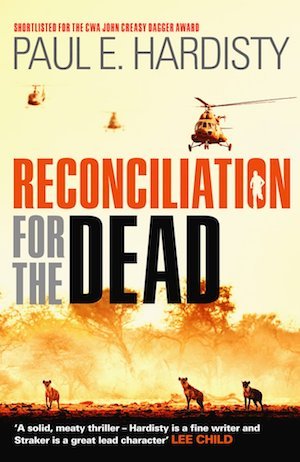
Claymore Straker enters this dilemma in the third and final book in Paul E Hardisty’s series, which also includes The Abrupt Physics of Dying and The Evolution of Fear. Straker is a young South African paratrooper serving as his country intervenes in the Angolan civil war. When he and his buddy Eben decide to save a young woman from being raped by an allied military group, they step right into the middle of a nasty confluence of apartheid and corporate greed, the true dimensions of which they learn during a long dangerous journey through war-torn Southern Africa.
Hardisty’s soul-blistering journey into the mercenary dark corner of the Cold War is told through Straker’s first-person narrative. Past events unfold through the young soldier’s eyes and are punctuated, quite jarringly and effectively, through transcripts of Straker speaking in the present to South Africa’s Truth and Reconciliation Commission. As he unburdens his guilt, perhaps at the expense of his own amnesty, we learn of the horrors he has faced and loved ones left behind, as he goes from hero to deserter to truth teller.
Straker and Eben learn the woman they saved is a communist rebel but are reluctant to deliver her back to the allied soldiers and their loathsome leader. They later learn he is just a profiteer trafficking ebony, ivory and blood diamonds. Straker’s sarge Crowbar is duty-bound, regardless of the moral outrages and stupid decisions of his superiors, so Straker must alone interpret the grey moral areas he faces. When he is wounded, he meets Vivian, an army nurse who belongs to a secret underground opposing the institutional racism and black ops of the apartheid regime. Their eventual alliance puts them both in grave danger against the mercenary known as Cobra and the evil Botha, both who are behind a much larger game involving biological weapons.
Hardisty’s prose conveys exceedingly well the adrenalin-fueled fear that comes with close combat and he uses the fog of war well to create suspense and tension. The characters are vivid and sympathetic, and you can feel Straker’s angst in this uphill struggle to find justice and personal meaning. There are two strong supporting characters including Vivian, a guardian with whom he forms a tenuous relationship; and his sardonic, intellectual bru Eben Barstow, who is the perfect foil during the deep injustices they encounter, and whose running commentaries come straight from Seneca and Cicero.
Reconciliation for the Dead is less a crime novel than a thriller about the tangled web of complicities bound in humanity’s worst crimes. The lead character is forever haunted by the victims of genocide, rape and racism. Thrilling as a war memoir, Hardisty’s choice of format is what makes it compelling reading. Though there are graphic descriptions of Straker’s many horrific incursions, it’s often what you don’t see that evokes the real horror. Hardisty brings the war into relief through the banal dryness of the court transcript, which keeps wresting you back into the moment of Straker’s cathartic telling. His agonising, hesitant testimony is punctuated with the phrase ‘witness does not answer’, which creates suspense for the death and betrayal we know is coming.
Sufficiently enjoyable as a standalone book, though this is the final book in the series it acts more as a prequel of sorts, showing Straker’s formative years before venturing into other conflicts, ever seeking personal redemption. As much as you can’t put this thriller down, you will look up from it often to digest what you’ve read and ponder the human condition.
Orenda Books
Print/Kindle/iBook
£2.80
CFL Rating: 5 Stars